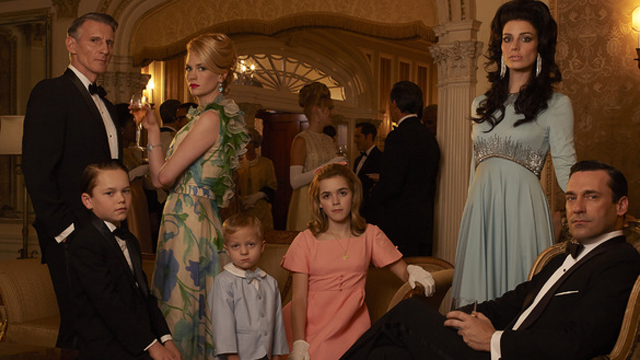
A few months ago, I wrote an article here about how to get pumped for the new season of Mad Men. In Season Five, the show had gotten so overtly damning to its characters and I had trouble caring what happened next. This season, the damnation only continued, as blatantly suggested by Don reading the Inferno in the first scene, and by his insistence, like some villainous Dracula, that his mistress, Sylvia, turn her cross necklace away from him whilst they canoodled.
I’ve enjoyed a lot of this season, but it’s also been exhausting. I realized tonight, to my horror, that with only one episode left in the season, I’m actually tired of thinking and talking about Mad Men, for the first time ever. Maybe if I had been watching the similarly draggy third season as it aired, rather than binge-watching it, Season Six might not set the precedent for that.
Season Six has been consistently comparable to Season Three, in fact--much of it has been aimless, and many scenes have been boring in the way that, on another show, you would say, "Oh, they're setting something up here." Except Mad Men viewers know at this point that a lot of the show doesn't add up to anything except cool subtext and anti-climax, (as is often the case in real life). Season Three chose to break up the monotony with a lawnmower accident and musical numbers, and President Kennedy was killed. This year the characters faced the deaths of Martin Luther King and Bobby Kennedy (the former was what Emily Nussbaum at The New Yorker called "a tone poem of white-person awkwardness," and the latter was used, to shocking effect, as merely a footnote to Don getting dumped), and in their own lives there has been a car crash, a dart-stabbing, a death by cancer, an off-screen mugging, a bayonetting, and a Dick-Cheney-style shot to the face while hunting.
It sounds pretty good when I put it that way. And it has been, kind of. I think the problem I have is not only that the show gone back to the same "Don cheats on his wife, he has everything but he takes it for granted, what can possibly save him?" arc it broke away from years ago to such compelling effect, but that it did so to teach us a lesson. That lesson is: times change, but people don't necessarily change or learn from their mistakes, man. The Hell imagery of the season premiere, in addition to the cross thing and the final moment of most recent episode, “The Quality of Mercy,” where Peggy calls Don a monster, have turned that subtle theme into the overt lesson it's become.
All this, of course, does not mean I will stop thinking or talking about the show. “The Quality of Mercy,” for instance, had a lot of great moments to offer: Pete Campbell admitting that Bob Benson, the conniving mystery man who came on to him in the previous episode, is handsome. A reference to Vaughn Meader, who is a very obscure and fascinating historical footnote. Everything relating to accounts man and actually-decent-person Ken Cosgrove, who this past season has assumed a role of slapstick martyrdom in the name of entertaining hedonistic Chevy representatives. And I love it any time the characters enthusiastically act out a hacky ad they plan on pitching, as they did in "Mercy" for a Rosemary's Baby-themed baby aspirin ad.

